#Build ADU on Property
Explore tagged Tumblr posts
Text
Maximizing Your Property: A Complete Guide to ADU Construction
Introduction: In recent years, Accessory Dwelling Units (ADUs) have gained popularity as a practical and profitable solution for maximizing property space. Whether you want to accommodate extended family, generate rental income, or create a dedicated workspace, building an ADU can be a smart investment. In this comprehensive guide, we will walk you through the process of ADU construction, from planning and design to permits and construction. By the end, you'll have a clear understanding of how to transform your property into a versatile and valuable asset.

Understanding ADUs: Before diving into the construction process, it's crucial to grasp the concept of ADUs. ADUs are secondary living units located on the same property as a primary residence. They can come in various forms, including converted garages, basement apartments, or standalone structures. ADUs provide separate living spaces with their own entrance, kitchen, and bathroom, allowing for independent living while still being connected to the main property. Understanding the types and potential uses of ADUs will help you determine the best approach for your specific needs.
Planning and Design: The first step in ADU construction is careful planning and design. Assess your property and determine the available space for building an ADU. Consider factors such as setbacks, lot size, and zoning regulations. Engage with an architect or designer to create a layout that maximizes space efficiency and meets your requirements. Pay attention to factors like natural light, ventilation, and privacy when designing the interior space. Additionally, consider the exterior aesthetics to ensure that the ADU complements the existing property and neighborhood.
Researching Local Regulations: Each jurisdiction has its own rules and regulations regarding ADU construction. Research the local building codes, zoning ordinances, and permitting requirements specific to your area. Some areas may have restrictions on ADU size, parking requirements, or rental regulations. Familiarize yourself with these regulations to ensure compliance and a smooth construction process. If needed, consult with professionals familiar with local ADU regulations to guide you through the permitting process.
Securing Financing: Once you have a solid plan in place, it's important to consider financing options for your ADU construction. Explore traditional financing avenues like home equity loans, personal loans, or refinancing. Additionally, research specialized financing programs available for ADU construction, such as ADU-specific loans or grants. Consider your budget and weigh the pros and cons of each option before making a decision.
Obtaining Permits and Approvals: Before construction can begin, you'll need to secure the necessary permits and approvals from local authorities. Work closely with your architect or designer to prepare the required documentation, including construction plans, engineering reports, and permit applications. Submit these documents to the relevant building department and ensure compliance with all regulations. The permit approval process may take time, so patience is key. Stay in communication with the building department and address any inquiries or modifications promptly.
Hiring Contractors and Construction: Selecting the right contractors for your ADU construction is crucial to ensure quality workmanship and timely completion. Seek recommendations, review portfolios, and interview potential contractors. Choose professionals experienced in ADU construction who can handle all aspects of the project, from site preparation to plumbing, electrical work, and interior finishes. Obtain detailed cost estimates and enter into written agreements to protect both parties. Regularly communicate with the construction team and monitor progress to maintain transparency and address any issues promptly.
Interior Design and Finishing Touches: As the construction nears completion, shift your focus to the interior design and finishing touches. Consider the functionality and aesthetics of the ADU. Opt for durable and low-maintenance materials that will withstand regular use. Pay attention to storage solutions, lighting, and fixtures that enhance the overall comfort and appeal of the space. If you plan to rent out the ADU, choose neutral colors and versatile designs that cater to a wide range of tenants' preferences.
Connecting Utilities and Landscaping: Before the final touches, ensure that utilities such as electricity, water, and sewage are properly connected to the ADU. Coordinate with utility providers to set up separate meters if necessary. Simultaneously, invest in landscaping that complements the ADU and enhances the overall appeal of your property. Consider pathways, outdoor seating areas, and vegetation that create a pleasant environment for residents or tenants.
Compliance and Inspection: Once construction is complete, schedule a final inspection with the local building department to ensure compliance with all codes and regulations. Address any issues or corrections promptly to obtain a certificate of occupancy. Compliance with all necessary requirements is crucial not only for safety but also to protect the value and marketability of your property.
Maximizing Returns: Finally, capitalize on the investment potential of your ADU. If renting, advertise the space through various channels and screen potential tenants thoroughly. Set competitive rental rates based on market analysis and maintain good communication with tenants. If using the ADU for personal use, enjoy the additional space while monitoring the property's appreciation over time. Periodically assess the ADU's functionality, make necessary repairs or improvements, and keep up with regular maintenance to preserve its value.
Conclusion: Building an ADU on your property can unlock a multitude of benefits, from increased living space to rental income and property value appreciation. By following this comprehensive guide, you're well-equipped to embark on your ADU construction journey and maximize your property's potential.
#Adu Construction#Build ADU on Property#Adu Builders Los Angeles#Accessory Dwelling Unit#Increase ROI with ADUs#Adu Contractors Los Angeles#Adu Construction Company#Adu in California#Adu Design Los Angeles#Adu Contractors#Adu Los Angeles
1 note
·
View note
Text
Unlock Your Home's Potential with ADUs by Avalon Studio Design Build

Avalon Studio Design Build specializes in transforming spaces with high-quality ADU (Accessory Dwelling Unit) construction services. Our expert team ensures every ADU project is seamlessly integrated into your property's existing design, providing a perfect blend of functionality and style. Enhance your living space or create a rental opportunity with a custom-built ADU that meets all your needs. Contact Avalon Studio Design Build to start your ADU project today!
Avalon Studio Design Build Huntington Beach, CA (714) 459-2821 https://avalonstudiodesignbuild.com/
#ADU#Accessory Dwelling Unit#Avalon Studio Design Build#ADU construction#home remodeling#custom ADU#property enhancement#ADU contractor
0 notes
Text
Me finishing up a long talk about labor politics and how airport 🛩️ workers should strike next -> logging on to girlblog about my favorite jet setting pop star Taylor Swift ✨🦄🎆💖⚡️ because having a fandom tumblr account or not isn’t actually praxis 🌹💪🏻👩🌾
#this post brought to you by a conversation with my touring musician partner#he tours the us with a relatively well known bluegrass band and they rely a lot on airplanes#travel has been making some of his friends miss entire gigs#so we were thinking about how to feasibly tour and make money and see family and not rely on airplanes and airport laborers#also talking about where to try and buy land at some point and the ethics of that vs trying to convince my parents to leave me their house#it’s in a really unique spot wrt local government and I am finding myself becoming involved in local politics about ADUs#and if I want to be able to one day turn this block into a commune I would like the right to build one!#but our conservative HOA has locked in on me as an ally in their fight against Additional Dwelling Units bc I am pushing for the environment#and someone brought up that the neighborhood is an old growth forest at the last meeting apparently!#anyways!! point is- it’s all fun and games to talk politics and Taylor but at the end of the day you can girl blog and not have that#reflect on your actual lived values and actions#plus! there’s definitely something worth while about using gossip as a way to understand what your values are!#me and my partner (a folk musician dedicated to labor movements through his working class ancestors/family) have talked a lot about Taylor#bc it’s fun! and she’s someone in his field! but also we can fine tune our beliefs about touring ethics by studying the worlds biggest tour#it’s fascinating!#c#Sam spam#hiding this deep in tags bc I’m scared:#let’s not eat Taylor when the time comes but maybe she can redistribute her land and properties to feed and house the homeless?#and pay climate reparations to families living within 1 mile of airports she uses#read something horrifying about lead in jet fuel and low income homes near airports….
0 notes
Text

This 2004 home on a hillside in San Diego, California feels like living in Italy. 5bds, 6ba, there is a sale pending for $2.995M.

The entrance is marble with rich wood, gold, and classic art.
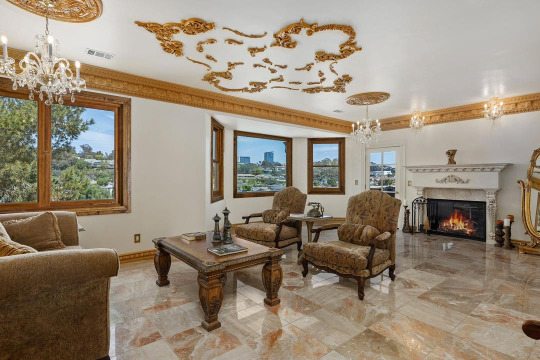
Why do I feel that the windows are too plain? They're bare, yet there's fancy gold crown molding, a bas relief ceiling, medallions and chandeliers, plus a carved fireplace. Even if there was just a valance.

The guest powder room has a very fancy gold sink table and toilet.
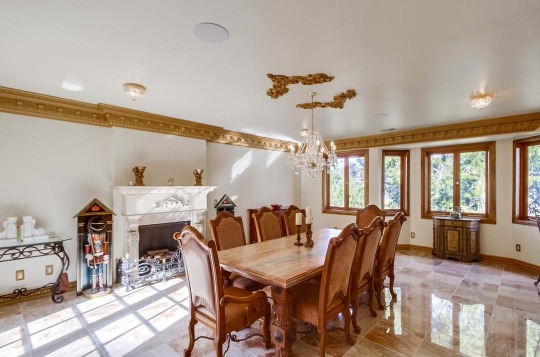

The dining room and kitchen share a large space. There's a fireplace, and it's spacious. I think it's convenient to have the dining room right near the kitchen, especially if you're doing the cooking and serving.
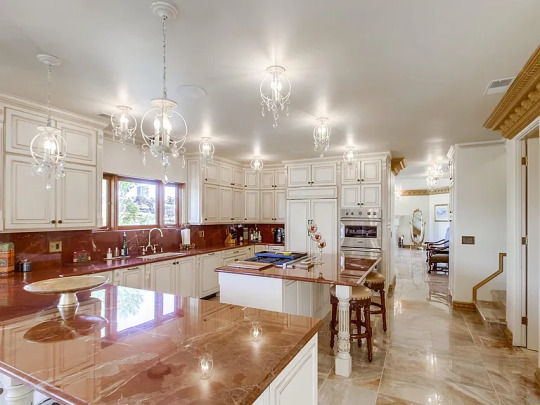
I like the cabinetry, counters and backsplash, but I don't care much for the lighting.
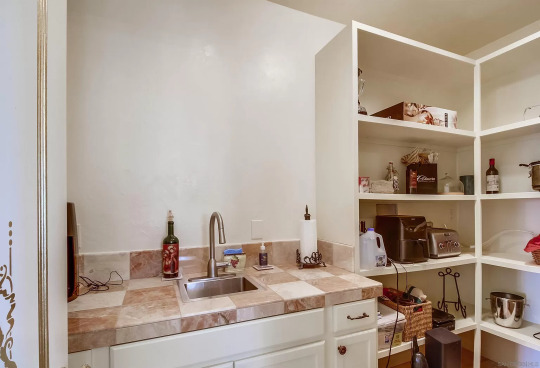
A simple pantry is off the kitchen.
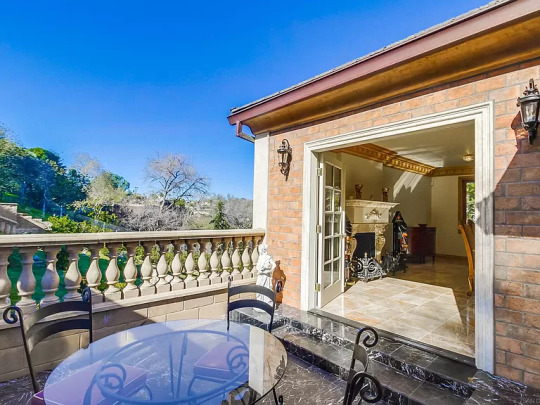
A lovely marble terrace is off the dining room/kitchen.


All of the fireplaces match, even in the primary bedroom. There is also a terrace off this room.
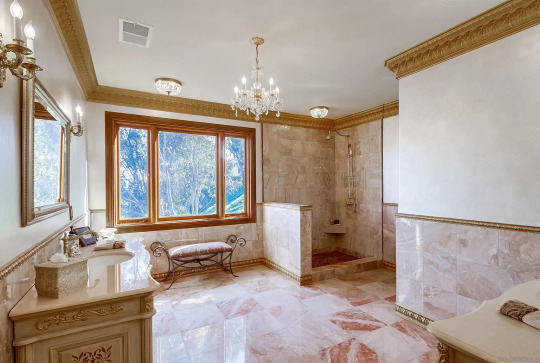
Marble primary en-suite. I like that the shower doesn't have glass doors.
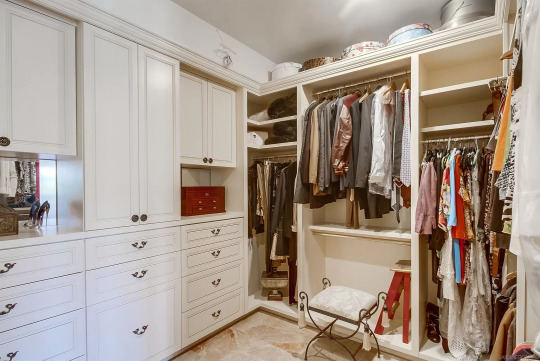
The primary bedroom closet.
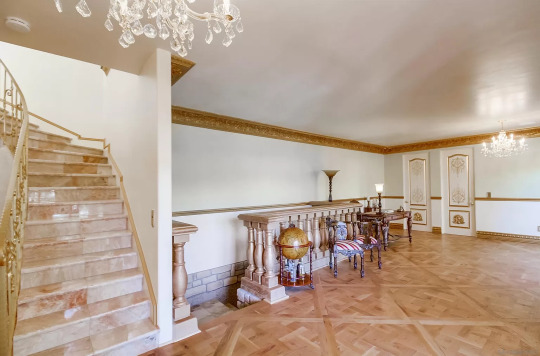
A balustrade that matches the exterior is in this very wide hall. Marble stairs go to the upper level.
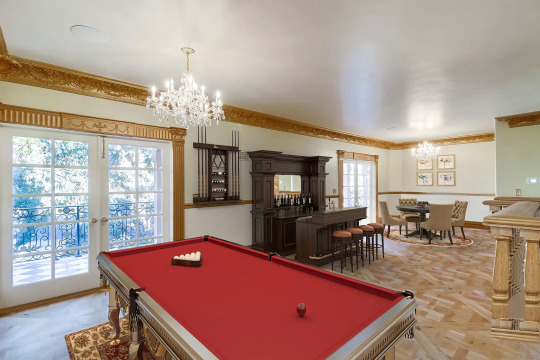
A game room with access to a patio and what appears to be 2 bars.
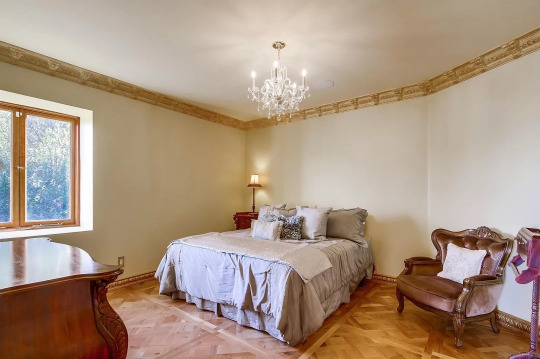
A secondary bedroom.

And, one of the other baths with marble and a copper tub.
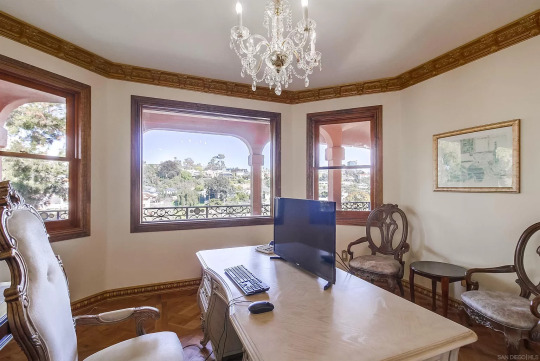
A simple home office.
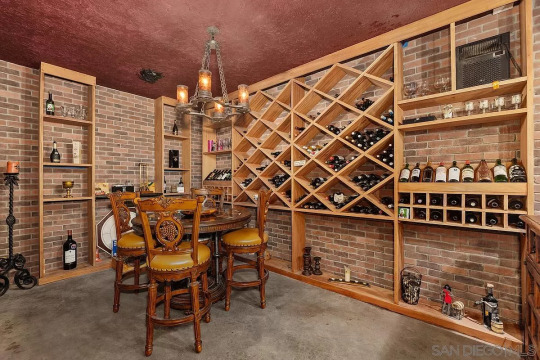
The wine cellar has a capacity for 750 bottles.
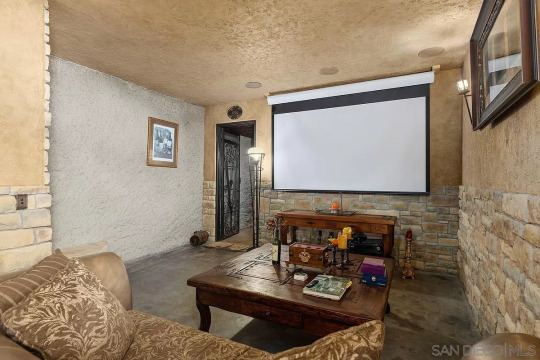
There's no home theater, but there's a family movie room.
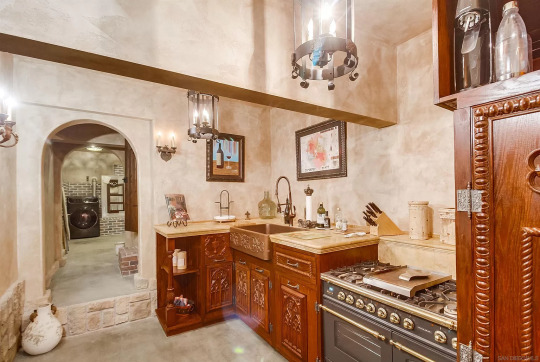
Wow, there's a fancy little entertaining kitchen here, too.
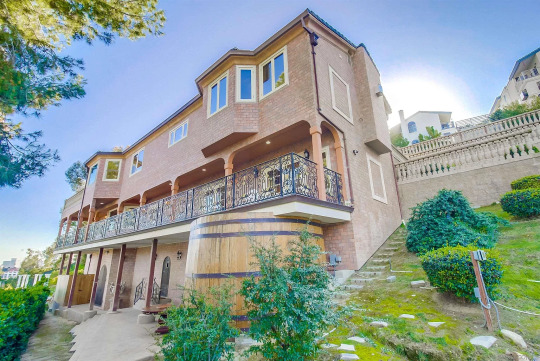
Isn't that interesting? Look at the big wine barrel. I wish the description said what if it's a room or what.

Doesn't this look like ruins? (Perfect ruins, but ruins nevertheless.)

There's a little over an acre of land, but it's very hilly.
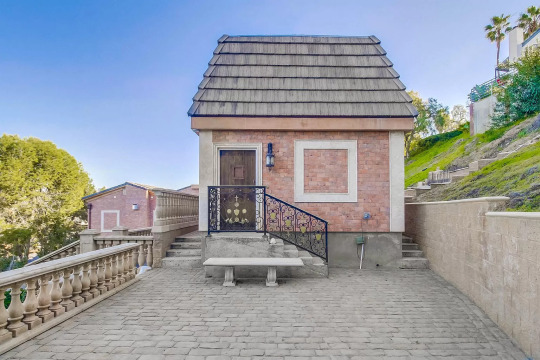
This is a small building that can be used for an ADU, or small adult living unit, for parents.

The property is gated- well, it already has my last initial on it. That's the closest I'll ever get to a property like this.
https://www.zillow.com/homedetails/900-W-Quince-St-W-San-Diego-CA-92103/2058623810_zpid/
56 notes
·
View notes
Note
Re zoning regulation reform: could you go into detail as what that would look like in terms of wiping the slate clean. I feel like it would be better to go the houston route and just be zoning free
You do not want to go the Houston route.
youtube
Houston may claim to be "zoning-free" - and to be fair, it doesn't have some of the more common regulations on land use, or density, or height restrictions (more on this in a minute) - but the reality is far more complicated and the status quo is not one that's friendly to the interests of working-class and poor residents, or to the possibility of sustainable urbanism.
The answer to NIMBYism isn't to abolish all regulations and let the free market rip, it's to surgically target zoning, planning, and litigation that is used against affordable housing, public/social housing, mass transit, clean energy, and walkable neighborhoods, and to replace it with new forms of regulation that encourage these forms of development.
So let's take take these categories in order.
Zoning
As I tell my Urban Studies students, zoning is both one of the most subtle and yet comprehensive ways in which the state shapes the urban environment - but historically it has been used almost exclusively in the interests of racism and classism. Reforming zoning requires going over the code with a fine-toothed comb to single out all the many ways in which zoning is used to make affordable housing impossible:
The most important one to tackle first is density zoning and building heights limitations. The former directly limits how many buildings you can have per unit of land (usually per acre), while the latter limits how big the buildings can be (expressed either as the number of stories or the number of feet, or as both). Closely associated with these zoning regulations are minimum lot size regulations (which regulate how much land each individual parcel of real estate has to cover, and thus how many how many housing units can be built in a given area), and lot coverage, setbacks, and minimum yard requirements (which limit how much square footage of a lot can be built on, and what kinds of structures you can build).
the other big one is use zoning. To begin with, we need to phase out "single use" zoning that designates certain areas as exclusively residential or commercial or industrial (a major factor that drives car-centric development, makes walkable neighborhoods impossible, and discourages the "insula" style apartment building that has been the core of urbanism since Ancient Rome) in favor of "mixed use" zoning that allows for neighborhoods that combine residential and commercial uses. Equally importantly, we need to eliminate single-family zoning and adopt zoning rules that allow for a mix of different kinds of housing (ADUs, duplexes and triplexes, rowhouses/terraced houses, apartment buildings).
finally, the most insidious zoning requirements are seemingly incidental regulations. For example, mandatory parking minimums not only prioitize car-dependent versus transit-oriented development but also eat up huge amounts of space per lot. The most nakedly classist is "unrelated persons" zoning, which is used to prevent poorer people from subdividing houses into apartments, which zaps young people who are looking to be roommates and older people looking to finance their retirements by running boarding houses or taking in lodgers, as well as landlords looking to convert houses from owner-occupied to rental properties.
So I would argue that the goal of reform should be not to eliminate zoning, but rather to establish model zoning codes that have been stripped of the historical legacies of racism and classism.
Planning
Similar to how zoning shouldn't be abolished but reformed, the correct approach to planning isn't to abolish planning departments wholesale, but to streamline the planning process - because the problem is that right now the planning process is too slow, which raises the costs of all kinds of development (we're focusing on housing right now, but the same holds true for clean energy projects), and it allows NIMBY groups to abuse the public hearings and environmental review process to block projects that are good for the environment and working-class and poor people but bad for affluent homeowners.
As those Ezra Klein interviews indicate, this is beginning to change due to a combination of reforms at both the state and federal level to speed up the CEQA and EPA environmental review process in a number of ways. For example, one change that's being made is to require planning agencies and environmental agencies to report on the environmental impact of not doing a project as well, to shift the discussion away from petty complaints about noise and traffic and "neighborhood character" (i.e, coded racism and classism) and towards real discussions of social and environmental justice.
At the same time, more is needed - especially to reform the public hearing process. While originally intended by Jane Jacobs and other activists in the 1970s as a democratic reform that would give local communities a voice in the planning process, "participatory planning" has become a way for special interests to exercise an unaccountable veto power over development. Because younger, poorer and more working class, and communities of color often don't have time to attend public hearing sessions during the workday, these meetings become dominated by older, whiter, and richer residents who claim to speak for the whole of the community.
Moreover, because community boards are appointed rather than elected and public hearings operate on a first-come-first-serve basis, an unrepresentative minority can create a false impression of community opposition by "stacking the mike" and dialing up their level of militancy and aggression in the face of elected officials and civil servants who want to avoid controversy. (It's a classic case of diffuse versus concentrated interests, something that I spend a lot of classroom time making sure that my students learn.)
Again, the point shouldn't be to eliminate public hearings and other forms of participatory planning, but to reform them so that they're more representative (shifting public hearings to weekends and allowing people to comment via Zoom and other online forums, conducting surveys of community opinion, using a progressive stack and requiring equal time between pro and anti speakers, etc.) and to streamline the review process for model projects in categories like affordable housing, clean energy, mass transit, etc.
Litigation
Alongside the main planning process, there is also a need to reform the litigation process around development. In addition to traditional tort lawsuits from property owners claiming damage to their property from development, a lot of planning and environemntal legislation allows for private groups to sue over a host of issues - whether the agency followed the correct procedures, whether it took into account concerns about this impact or that impact, and so forth.
As we saw with the case of Berkeley NIMBYs who used CEQA to block student housing projects over environmental impacts around "noise," this process can be used to either block projects outright, or even if the NIMBYs eventually lose in court, to draw out the process until projects fall apart due to lack of funding or the proponents simply lose their patience and give up.
This is why we're starting to see significant reforms to both state and federal legislation to streamline the litigation process. The categorical exemptions from review that I discussed above also have implications for litigation - you can't sue over reviews that didn't happen - but there are also efforts to speed up the litigation process through reducing what counts as "administrative record" or by putting a nine-month cap on court proceedings.
Again, this is an area where you have to be very surgical in your changes. Especially when the politics of the issue divide environmental groups and create odd coalitions between labor, business, climate change activists, and anti-regulation conservatives, you have to be careful that the changes you are making benefit affordable housing, clean energy, mass transit and the like, not oil pipelines and suburban sprawl.
#public policy#housing#zoning#policy history#urban planning#public housing#social housing#yimbys#yimbyism#affordable housing#urban studies#urbanism#houston#nimbyism#nimbys#environment#climate change#clean energy
95 notes
·
View notes
Text
Nearly every article the LA Times has run about ADUs in their fucking style section is a story of a boomer parent adding an ADU to their property for their child and their spouse to live in.
Here are the questions I am left with:
How do ADUs make housing more affordable for people who do not have boomer parents with a big backyard and a big wallet?
If it's the adult-children making the investment in adding the ADU how does that investment build equity when they don't actually own the property?
The plan here is that the parents eventually die and leave the whole property to the children, right? And that's their equity?
What if there are siblings who are co-inheritors of the property? How do you divide that?
What if you want to buy a house but you don't want to live 20 feet from your parent?
For the record, today's story is a $475,000 pre-fab ADU. $475,000. That would be a whole-ass house in a different city or state where you could in fact actually build some equity.
I am so sick of these fucking articles. This is a fucking ridiculous suggestion for the vast majority of people hoping to buy a home. And they're always accompanied by these ridiculously rosy stories about how happy the people are to have made this choice or investment and ALWAYS a quote from the parent about how happy they are to have the kids so close.
I feel like the LA Times is just printing propaganda about the housing market here. Is it for boomers? Is that who is feeling better about themselves when reading these articles?
Make this make sense to me. I do not understand.
57 notes
·
View notes
Text
Eris' Tax Shelter
This one is both timely and a PSA for anyone wanting to make use of their Legendary Shards prior to the launch of TFS. So I give this to you here. Direct link to Ao3 if you prefer to read it there: https://archiveofourown.org/works/56339362
ACCESS: RESTRICTED DECRYPTION KEY:0GLVP1A437$IKO-006 REP#: 303-DERELICT-AUDIO AGENT(S): AUN-326 SUBJ: VIP#1316 AND ERI-223 INTERACTIONS - POTENTIAL BRIBERY, ILLEGAL LOBBYING & MANIPULATION OF TAX LAWS
[BEGIN TRANSCRIPT]
"Finally, someone I actually want to check up on me!"
"I am observing some very strange Guardian behaviour on Luna and believe it may fall under your area of expertise, Rat."
"My area of expertise? How so?"
"It seems financially motivated and of questionable legality."
"Ha! This doesn't sound like a conversation we should be having on Vanguard comms. Why don't you come over for lunch?"
"Hmmm... you are probably correct. Will you make... the sticky rice?"
"Sticky rice needs to soak for several hours before I cook it. How about sandwiches for today and you come over for sticky rice lunch tomorrow."
"I enjoy your sandwiches. Unfortunately, I will be on Mars tomorrow."
"I'll bring it to ya. You coming over now or what?"
"I will be there soon."
.
"So, do tell me what Guardian behaviour requires my... what'd you call it? Expertise?"
"They are lined up at my Lectern of Enchantment to purchase Phantasmal Fragments at a rate and volume that is... extreme. I cannot imagine why."
"Oh! I do know all about that, actually."
"You do?"
"So, city administration just passed a law. Tax law. Goes into effect Tuesday. War effort stuff."
"I knew they were doing... something... I had not paid attention to what."
"Course not. Doesn't affect ya on the Moon, but that is, in fact, why it is currently affecting ya on the Moon."
"How does city tax law have any impact on the Moon?"
"It's the fact that it don't that's the impact. You, oh beautiful, three-eyed, former god of vengeance, happen to live in a zone which has never been part of city or Vanguard taxation."
"I am well aware. At one point the Cryptarchy attempted to claim some sort of jurisdiction over Sanctuary on Luna. Thankfully Ikora was able to put a stop to... whatever that bureaucratic ridiculousness was."
"Good thing too. You know those bits of legendary weapons everyone gets from disassembling shit they find lying around?"
"The shards, yes. That's what they are using at the lectern. They are not generating fragments with glimmer."
"Right. Come Tuesday, all legendary shards become property of the city to help with the war. They need the components to help fight off the pyramid forces on the ground, shore up the ADU's, build weapons for civilians, generally help keep shit movin' an' functional."
"This makes sense, although would that not render the shards financially useless?"
"Exactly."
"I can understand why they would spend them now then, but why on the Moon?"
"In addition to bein' outside any city taxation zones, and therefore, not technically by the letter of the law evadin' anything, your Phantasmal Fragments take up very little space, Moondust. And several places will still exchange 'em for glimmer, in particular the Cryptarchy and our friend who likes us ever so much, Rahool."
"Rahool is terrified of me and he loathes you."
"He and I have a uh... complicated relationship. But yeah. Because the Moon is where it is, legally-speakin' there ain't any laws being broken. And your fragments are super portable."
"I would assume so. They are ethereal whisps of nightmares manifested from the Ascendent plane. Their corporeal instantiation is minimal. They are barely quantified concretions from the energies of phantoms which only manifest fully under specific circumstances."
"Pieces of ghosts. Not like... Guardian ghost-ghosts, but actual ghost-ghosts."
"That is one way of putting it."
"And ghosts don't take up much room."
"I do not follow."
"They use your table to turn the shards into Phantasmal Fragments and then they can keep the fragments and sell them for glimmer later, rendering the soon-to-be-useless shards, useful, long after they cease to be able to be used."
"Hmmm..."
"People've been calling it 'Eris' tax shelter' on Vannet."
"The Lectern of Enchantment is something I built and utilized to harness the vile magic of the Hive in order to transform the negative energies on the Moon into components which can be used to fight the forces of the Witness. It is not a tax shelter! I must inform Ikora."
"You can do that, sure. But they are still using it as intended. It's just that its current intended use for this specific purpose happens to currently be... profitable."
"Are you using it?"
"Me? Nah. Do I currently have several high-density containment units filled with your Phantasmal Fragments? Yeah. But I've had that for a while. I got components for everything. You've seen what's on my ship. I ain't currently buying any from ya right now, nor am I gettin' anyone to buy 'em for me as a favour, if that's what you're wonderin'. I do enough things of... questionable legality already. Tax evasion is such an easily proveable activity. And since I am not a Guardian, when I'm not on the Moon hangin' out with you, I am, technically, under the jurisdiction of the city and subject to its tax laws as a resident thereof. I run a business outta the tower after all. I got several shipping crates of legendary shards just waitin' to be turned over to city authorities. And all the paperwork for it prepared too. Ol' Drifter's gonna be on record for being among the biggest donors of legendary shards to assist with the Last City's war preparations. Can't do that if I convert 'em."
"Hmmm... You are not an altruist, Rat. Why aren't you using this... tax shelter?"
"I am an altruist on paper, Moondust. That's where it counts."
"Why?"
"Different aspect of city tax law. Thing called tax credits. You donate in certain approved ways, you get a credit to count against taxes you'd otherwise have to pay. Gambit's been making quite a lot of glimmer for me. The more tax credits I get, the less tax I pay. If this goes the way it's movin' now, city's gonna end up owing ol' Drifter quite a lot of cash. They won't be able to pay, of course, so they'll need to work it out with me some other way."
"The entire city is going to owe you favours?"
"Hypothetically, yeah. That's one of the reasons why I may have... hypothetically... suggested it to the council in the first place, yeah."
"Wait... You're on the city council?"
"Not officially. I'm a... what you'd call an unofficial adviser. Very unofficial. In theory, purely in theory, mind you, some of the higher ranking members of city council might, hypothetically, owe me some favours and every once in a while I might ask 'em to vote a certain way or put forth a specific idea. Hypothetically, of course."
"You're manipulating the socio-political structure of the Last City to your own ends."
"If I were, not sayin' I am, mind you, but if I were, I would not be doin' it in a harmful way, nor in any way that could be considered illegal on paper."
"How many city politicians do you own? Hypothetically."
"In theory, enough to swing a vote in my favour if I need one. Definitely enough to offer clemency or a pardon, if yours truly was ever caught doing something that might need to be pardoned. Not that I am in the habit of gettin' caught, mind you, but it's always nice to have a backup plan, just in case."
"So the reason all these Guardians are buying Phantasmal Fragments on the Moon right now is because they are about to become useless due to tax law you helped to put in place?"
"Hypothetically."
"And you did this because you needed to lose money on paper so that you can pay less taxes on your Gambit earnings?"
"Now, don't go spreading that theory around. Lotta people are pretty pissed about the whole devaluing of shards thing, especially Spider. Mithrax won't let him use your tax shelter."
"It isn't my tax shelter!"
"House of Light is hoping to be the number one group donating legendary shards to the war effort. Should give 'em very, very good optics in a very direct and undeniable way. Help 'em out quite a bit, politically, and will definitely soften quite a few people's hearts toward them as a whole. It's exceptionally good PR. Not the best for Spider's finances though. Although, what with all that money that up and disappeared for rebuilding the Eliksni quarter, it is kinda poetic that Spider's about to take a hit in the finance department. Strange, that. Couldn't see that coming. Spider sure is pissed over it. Can't imagine why."
"This has nothing to do with your taxes. You are helping the House of Light."
"Oh, it has everything to do with taxes, and anything pertaining to mine is pure conjecture, but if it does end up also helping the House of Light, why that's just another happy accident. And something it does help, undeniably and un-hypothetically, is the city. It's good for them. They need this."
"Fascinating."
"So... that's why everyone's lined up on Luna buyin' your fragments, Moondust. Eris' tax shelter is the talk of the town right now."
"I see."
"And you could pull in the Vanguard, tell Ikora about it, have her and Zavala put a stop to it, but you know how the Vanguard is with policies and procedures. By the time the bureaucrats and administrators actually manage to agree on something it'll be long past Tuesday. And, to be honest, preparing to go into the Traveler's probably a much higher priority for everyone right now. So what if some guardians end up making a bit of cash? Who does that hurt?"
"Aren't the shards they are spending something that could be used to improve the city's defenses?"
"I don't think you're aware of the scale involved in this one, Moondust. Guardian's don't have a lot of spare room in what they carry around. That's the whole reason why anyone has those legendary shards in the first place. Ya get 'em from disassembling guns and armour. They do that because they got no where else to put 'em. Whereas someone like yours truly or the House of Light, we've been able to stockpile some significant amounts. City's gonna be doing just fine for shards. Trust. What's goin' on over on Luna is just a drop in the ocean compared to what's about to be infused into the city infrastructure. It ain't hurtin' no one, except maybe Spider's pocket book, and he's been lining that with other people's glimmer for a while. 'Bout time he was required to be more... generous for a change."
"As usual, our conversations regarding your areas of influence never cease to be simultaneously both impressive and concerning."
"Any day I can manage to impress you is a good day in my books, Three-Eyes."
"Tsch."
[END TRANSCRIPT]
#destiny 2#eris morn#the drifter#drifteris#moonrat#moonrat radio#my writing#drifter/eris#the drifter/eris morn#eris' tax shelter#narrative hypothetical explanation of game mechanics#hypothetically speaking of course
9 notes
·
View notes
Text
Making an Accessory Dwelling Unit a Cozy In-Laws Residence

A separate living area that is either attached to or independent from your main residence is referred to as an ADU, or extra dwelling unit. ADUs can be used as rental properties, home offices, or lodging for your in-laws. While guest houses or pool houses are similar to ADUs, which are usually found in the backyard, ADUs differ in that they have their own kitchen and bathroom. Although there are many different types of ADUs, including junior ADUs and conversion ADUs, in this article we will focus on the "in-law suite" or "in-law apartment".
Think about a few things before developing an ADU with an in-law suite. You must first choose the unit's size and configuration. You should also consider how you will grant access to the apartment, such as by creating a separate entry or sharing an entrance with your principal property. You must get the required permits and approvals from your local government after deciding on the size and layout of the in-law unit. It's crucial to plan ahead and give yourself plenty of time because this process can take some time.
Here are some pointers for using a contractor to construct an ADU for your in-laws.
1. Perform due diligence on contractors before hiring one. Search online for "build an ADU information" and "ADU builders near me" to find contractors who specialize in various construction projects, including ADUs or in-law units, and have expertise working on projects that are comparable to yours. Make sure the contractor is dependable and trustworthy by reading reviews.
2. Once you have a contractor in mind, request a thorough project estimate. Make sure the estimate covers all the costs for labor, materials, and other project-related expenses. Make certain the contractor is enthusiastic about your project and takes the time necessary to learn about your goals and vision. You may avoid unforeseen expenses and stay inside your budget by doing this.
3. Discuss Design: Discuss the ADU's design with your contractor. Make sure the plan satisfies your in-laws' requirements and adheres to regional building regulations. Discuss any unique requirements you may have with your ADU contractor.
4. Prior to beginning the project, be sure to obtain a contract. Every aspect of the project should be covered in the contract, including the expected cost, the schedule, and any other pertinent facts. In the event of a disagreement, this will serve to protect both you and your contractor.
5. Keep Involved: Keep in touch with your ADU contractor and stay involved throughout the project. Make that the building of the in-law suite is going as planned and that any alterations are discussed and approved.
Cove Security - Greater protection. Greater peace of mind. You deserve the peace of mind that comes from monitored fire and smoke protection. With Cove, no matter where you are, we can send the authorities to take care of what matters most to you.
2 notes
·
View notes
Photo
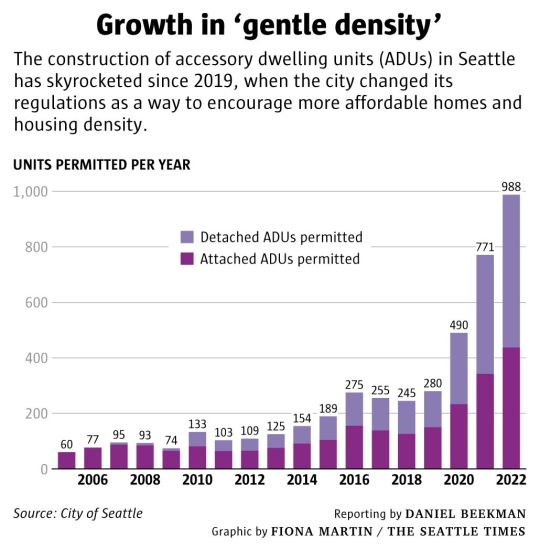
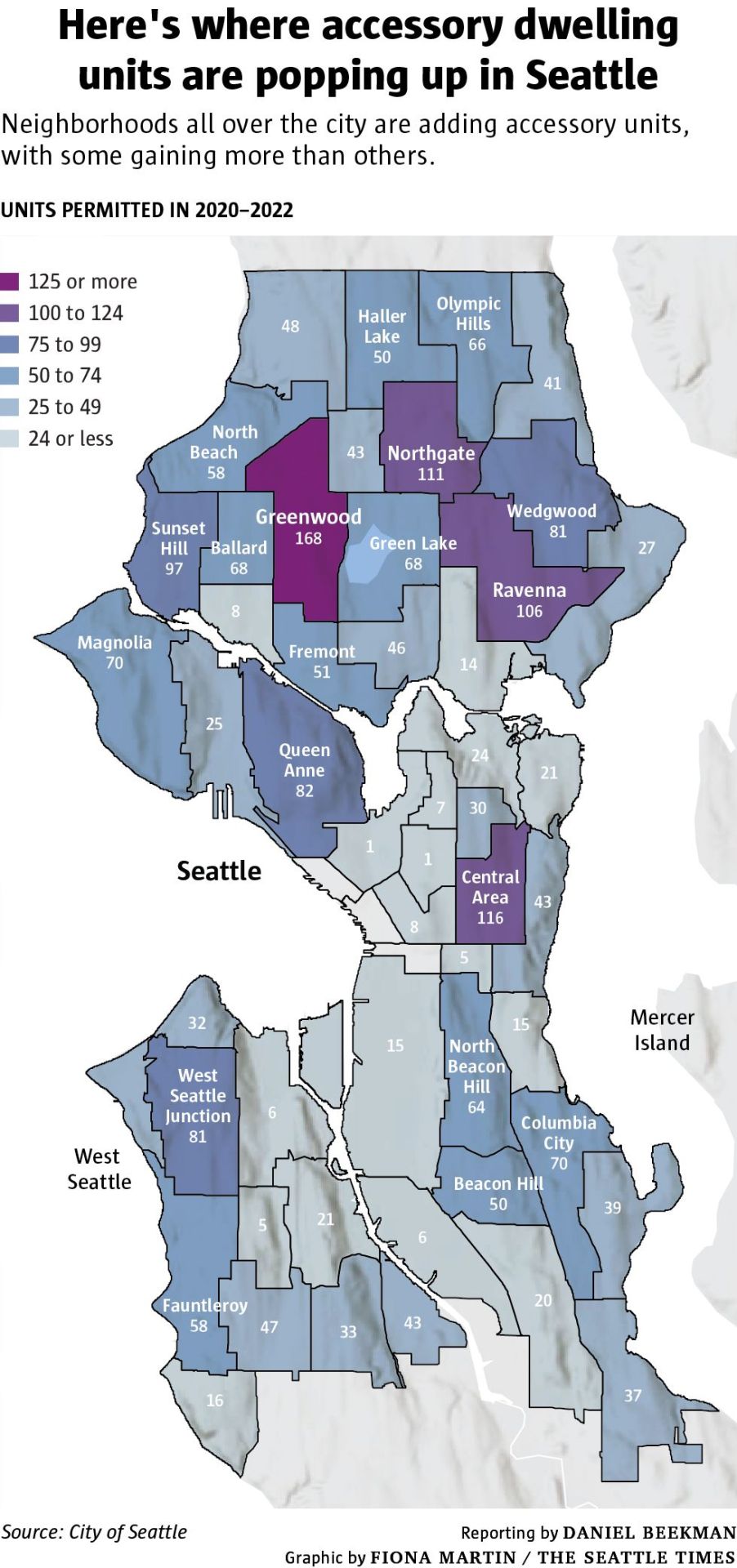
Seattle is now building more ADU’s than single homes Seattle Times 03.08.23
2019 Changes..
“Seattle has allowed two ADUs per lot (either two AADUs, or one AADU and one DADU), rather than one. Property owners are no longer required to live on site, and ADUs no longer require off-street parking. DADUs can be built larger (up to 1,000 square feet, plus garage space), taller and on smaller lots than before.”
“In contrast, Johnson is a developer whose company, Blackwood Homes, is building house-AADU-DADU packages. The ADUs in those projects, which can sell for more than $700,000, aren’t going to serve low-income residents without subsidies. “
“..a growing number of ADUs are being permitted as condominiums and sold separately. They’re not necessarily cheap, with a median unit selling for $732,000 in a limited sample analyzed for the city’s report. The report estimates that 12% of ADUs in Seattle are currently licensed as short-term rentals like those advertised on Vrbo and Airbnb.”
in comments.. “What happens, instead of a single family home, adding an ADU in the back for extra income, developers scrape the single family home, build 3 new ones on the lot, a new single family homes, an ADU and a DADU, turn them into "condos" and sell them separately. For example, there is a development in Greenwood, where the single family homes goes for 1.7 million and the ADU and DADU's go for around a million each. No different than townhomes that had to be built on LR zoned lots. More of these are being built in Wallingford. It's extra housing, but certainly not affordable housing.”
#seattle#zoning laws#ADU#housing density#infrastructure#city planning#affordable housing#real estate developers#2023#PNW
2 notes
·
View notes
Text
Additional Dwelling Unit Permit Brampton | Ag Consulting Solutions
How to Navigate the Process of Obtaining the Permit in Brampton for an Additional Dwelling Unit
When considering the increase of square footage of your home, or increasing property value, adding an additional dwelling unit (ADU) is a hot topic. When you’re a property owner in Brampton, it is important for you to understand the additional dwelling unit permit requirements and process. Here’s how Ag Consulting Solutions can support you every step of the way.
What is an ADU (Accessory Dwelling Unit)?In TPG words, an ADU is a backyard home. It could be a basement apartment, a coach house, or even another rental unit. These types of units are extremely desirable, as they offer affordable housing options and a potential source of additional income. However, that is contingent upon going through the correct permitting and zoning process.
In Brampton, why do you need an ADU permit?
For example, in Brampton, a homeowner who wants to set up an ADU must follow certain guidelines imposed by the local government. They provide rules governing whether the construction follows safety, zoning, and neighborhood requirements. To ensure that your ADU complies with all the laws and regulations, it is necessary to obtain a permit. An Additional Dwelling Unit Permit Brampton.
Acquiring this permit is essential for the following reasons:
Legal Compliance: Failure to secure the correct permit can result in fines, having your removal, or problems contradicting the selling of property.
Safety: A permit guarantees that the unit is safe for its occupants and properly built.
Increased Property Value: A legal ADU can be a substantial boost to the value of your property.
Officially, ADUs (Accessory Dwelling Units) are in the process of getting permission for them in Brampton.
The process of Additional Dwelling Unit Permit Brampton can be confusing, but with proper guidance, it becomes simple. Here’s a quick rundown of what to watch for:
Look Into Zoning Laws: Not all properties are suitable for an ADU. First, your property must be within specific zoning requirements because that’s what limits getting one built, such as minimum lot sizes, parking requirements, and setbacks.
Design and Drawings: Once you meet the zoning criteria, detailed architectural plans of your ADU are required. These plans must adhere to building codes and municipal regulations.
Application Submission: The last stage is submitting the ADU permit application to the Brampton City Planning Department. Let Ag Consulting Solutions do the work to ensure accurate and efficient preparation and filing on your behalf.
Permit Approval and Construction: After your permit gets approved, the construction phase begins. We will work with contractors and ensure that the project is on time and meets all codes.
How Ag Consulting Solutions Can Assist
At Ag Consulting Solutions, we provide expert assistance to property owners in Brampton who are seeking an Additional Dwelling Unit Permit Brampton. Our expert team offers:
ADU consultation services: We provide expert advice and help you determine if your property qualifies for an ADU.
Permit Applications: You don’t have to touch a single piece of paper or even fill out an application; we do it all!
Compliant Design: We ensure your ADU design complies with local codes.
So You’re Ready to Add an Additional Dwelling Unit?
If you are interested in an ADU for your property in Brampton, Ag Consulting Solutions can teach you how to do the same. Take the first step to the increased home and property value—contact us for a consult!

#ag consulting solutions#Additional Dwelling Unit Permit Brampton#Additional dwelling unit permit Mississauga
0 notes
Text
Key Considerations Before Adding an ADU to Your Property

Building an ADU (Accessory Dwelling Unit) on your property can provide valuable benefits, from boosting your property’s value to offering extra living space. However, the process involves careful planning to ensure everything runs smoothly. Here are some crucial factors to evaluate before starting your ADU project.
Navigating Zoning Laws and Permit Requirements
The first step in planning your ADU is understanding the local zoning regulations and building codes that apply to your property. Different cities and municipalities have specific rules regarding ADUs, such as size limits, setback restrictions, and height guidelines. You’ll need to familiarize yourself with these requirements and obtain the proper permits to move forward legally. Consulting your city’s planning department can help you navigate these regulations and avoid complications during construction.
Choosing the Ideal Location for Your ADU
The placement of your ADU plays a crucial role in its practicality and appearance. Consider the size of your lot, the existing structures, and the overall flow of your property. Whether you’re converting a garage or constructing a separate unit, the ADU should blend naturally with your home’s layout while preserving ample outdoor space. Additionally, it’s important to think about access—ensuring the ADU is easy to reach for residents or guests without disrupting the flow of the main house.
Assessing Utility Systems and Infrastructure
Another key factor is determining whether your current utility infrastructure—water, electricity, and sewage—can support an additional living space. Depending on your property’s capacity, you may need to upgrade these systems to handle the new load. Collaborating with a licensed contractor can help you evaluate whether your utilities are sufficient or if improvements are necessary. Ensuring that the ADU won’t overwhelm your existing infrastructure is essential for the long-term functionality of your home.
Ensuring Privacy and Planning for Parking
When designing your ADU, privacy for both the main home and the new unit is a top priority. Thoughtful landscaping, fencing, and window placement can help maintain a sense of privacy for everyone. Parking is another important consideration, as many municipalities require additional spaces for properties with ADUs. Factor in parking needs to remain compliant with local regulations while ensuring residents and visitors have convenient access.
By thoroughly considering these aspects, you can design an ADU that complements your property while meeting local requirements. Careful planning will help you create a practical, valuable addition to your home, offering flexibility and enhanced living options for years to come.
#ADU construction#property evaluation#zoning regulations#utility capacity#building an ADU#ADU design#parking requirements#space assessment
0 notes
Text
Best ADU Builders in Seattle
When considering building an Accessory Dwelling Unit (ADU) in Seattle, finding the best ADU builders in Seattle is crucial to ensuring the success of your project. ADUs offer a great way to maximize property value while providing additional living space for family members, guests, or even as a rental unit. With Seattle’s growing demand for affordable housing, ADUs have become an increasingly popular choice for homeowners looking to expand their property.

The best builders in Seattle have a deep understanding of local zoning laws, building codes, and the unique challenges of the city’s landscape. From selecting the right design to managing the construction process, skilled ADU builders help bring your vision to life, ensuring quality work that meets all regulations.
When searching for best ADU builders in Seattle, it’s essential to consider experience, reputation, and expertise in handling ADU projects. Builders who specialize in these structures will offer creative solutions tailored to your specific needs and budget, whether it’s a detached unit, garage conversion, or basement remodel.
For a successful ADU build, working with a trusted professional ensures that the project stays on track and within budget.
Reach out to LYD Construction for expert ADU construction services.
LYD Construction
1 143rd Ave SE, Bellevue, WA 98007, United States
+ 1 425 754 4545
0 notes
Link
Fixing and improving your home or business is easier with Handyman services in Newark CA, to handle the work. From drywall installation to TV mounting service near you, experts can save you time and effort. At Honest Victor Handyman, we provide services like handyman painting, drywall, and roof fixing, as well as ADU contractors and general construction services. We also offer commercial handyman services near you to help businesses stay in great shape. Our team delivers quality results if you need help with handyman hardwood floors in Newark CA. Call Honest Victor Handyman today for reliable and affordable repair services!
#Commercial Handyman#Handyman hardwood floor#Handyman painting drywall and roof fixing#Handyman painting#Handyman services
0 notes
Text
Design Your Own Tiny House: The Future of Affordable Living
Home prices are at an all time high. Communities need options for more affordable homes. Accessory Dwelling Units may be one answer to the growing problem. Small, efficient, and less expensive, these houses need to be a part of every community’s plan to address the affordable home crisis.
The cities of Des Moines, Cedar Rapids and Iowa City are very favorable towards ADUs and have more flexible codes when building a tiny home. If you are considering an ADU then you may think about designing your own tiny house.

Why Design Your Own Tiny Home?
While a trusted ADU builder will have pre-made floor plans, you can bring your creativity and requirements to the design table. Create a tiny home to fit your lifestyle, budget, and personal taste. You may choose a simple one-bedroom retreat or a more intricate multi-functional living space; it just depends on your needs and budget.
Tiny Homes in Des Moines
The tiny home movement has experienced a surge in Des Moines as many residents are seeking alternative options for homes that cater to affordability and sustainability. Tiny homes in Des Moines provide a unique opportunity to take advantage of the growing number of people wanting to downsize and live a simpler life. While Des Moines offers more flexible regulations when it comes to building an ADU, there are still permits, set backs, and building codes that one needs to be mindful of.
The Best Home Builders in Des Moines for Tiny Homes
Designing your own tiny home can be a fun and exciting experience, but hiring an experienced tiny home builder can also save time, money and potential headaches when it comes to all that needs to be considered when building an ADU. Choose a custom home builder that specializes in tiny homes and has a complete turnkey service to give you the best possible building experience.
Attached or Detached ADU?
ADUs can be used for many purposes, like guest houses, rental units, or housing for aging parents. The reason you are building an ADU can help you determine if you are better off with a stand alone detached unit, or expanding your current residence with an attached ADU. The size and layout of your property will also have an impact on which style you choose.
ADU Plans: Design Your Space for Maximum Functionality
No matter what design or floorplan you choose, it’s important to plan for maximum functionality. Tiny homes have limited space, so including space saving features will be important. One example would be a Murphy bed that folds up to create space for a sitting or work space area.
Conclusion
Designing your tiny house can be an exciting adventure. There is much to consider when thinking about the need, timing and budget. For residents in Des Moines, Cedar Rapids and Iowa City, Iowa, Tiny Homes of Iowa is here to help you navigate each step of the design and build process. We offer many plans to choose from with the flexibility of your design input. Reach out today to get started!
#accessorydwellingunitplans#adubuildersiowa#aduplans#adu builders iowa#attachedadu#aduspecialistsiowa#tinyhomes#TinyHomesIowaCity#Tinyhomebuildersiowa#DetachedADU#besthomebuildersindesmoines
1 note
·
View note
Text
ADU Home Builder: Crafting Personalized Accessory Dwelling Units for Modern Living
Looking to add an Accessory Dwelling Unit (ADU) to your property? Our expert ADU home builders specialize in creating functional, stylish, and custom spaces tailored to your needs.
0 notes
Text

Build Your Dream ADU in San Diego Today
Need expert ADU construction in San Diego? House to Home delivers top-notch accessory dwelling units designed to maximize space and add value to your property. With years of experience, we ensure that every project is efficient and hassle-free. Contact us at https://www.housetohome.com/adu-builders-san-diego/ today!
0 notes